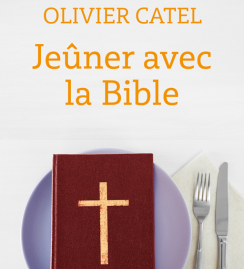Jeûner avec la Bible is the new book by Fr. Olivier Catel, OP.
What is fasting? An ascetic practice? A spiritual exercise? What does the Bible tell us? As part of his thesis on fasting, Fr. Olivier explains the significance of his brand-new work.
“With Lent, the question of fasting arises again. In the Old Testament, in addition to the major penitential fast of Yom Kippur, the Israelites fast as a sign of mourning, to implore God’s protection in the face of danger, to ask for forgiveness, and to practice penance. One who fasts becomes physically weak, poor before God, and thus acknowledges God’s omnipotence. Fasting, therefore, carries various meanings. The New Testament speaks little of fasting and gives no commandment. Jesus fasts for forty days in the desert, but should we do the same? This fast is a very personal trial for Jesus. Satan tests his messiahship and divinity there. When the disciples of John the Baptist and the Pharisees ask Jesus why his disciples do not fast, Jesus replies that fasting in sadness while waiting for the Messiah makes no sense when “the Bridegroom” is present.
Contrary to modern conceptions, fasting is not a body-wellness exercise or merely an ascetic practice to draw closer to God. In the Shepherd of Hermas, there are two ways to fast. The less perfect way is to reduce food intake to control one’s passions and avoid sinning. The more perfect way is to partially deprive oneself of food – abstinence – without causing harm, eating only bread and water, and calculating the money saved, which is then given to the poor who are hungry. The poor, thus nourished, express their gratitude to God for the generosity of their benefactor, and God, in return, grants spiritual graces to the donor. This perfect and holy practice is a beautiful illustration of the communion of saints, that is, the circulation of charity and grace. It offers an inspiring model to guide our own practices. We must rediscover this collective and social dimension that gives full place to the neighbour.”
Get a copy of Fr. Olivier’s books at the Éditions du Cerf.
Support the ÉBAF

